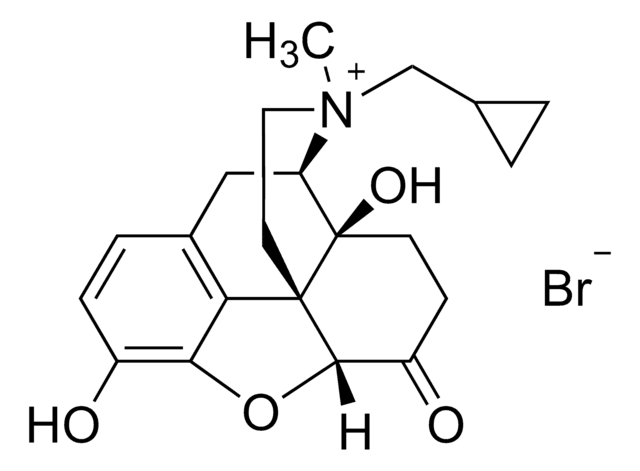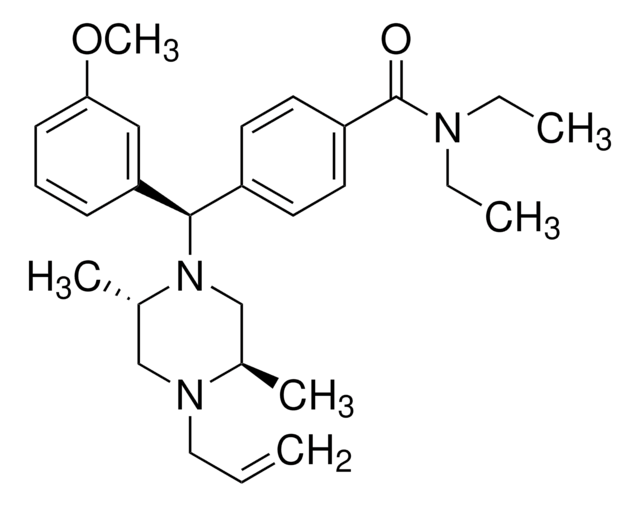E7384
[D-Ala2, N-Me-Phe4, Gly5-ol]-Enkephalin acetate salt
≥97% (HPLC)
Sinónimos:
DAGO, DAMGO, Tyr-D-Ala-Gly-N-methyl-Phe-Gly-ol
About This Item
Productos recomendados
Quality Level
assay
≥97% (HPLC)
storage temp.
−20°C
SMILES string
CC(O)=O.C[C@@H](NC(=O)[C@@H](N)Cc1ccc(O)cc1)C(=O)NCC(=O)N(C)[C@@H](Cc2ccccc2)C(=O)NCCO
InChI
1S/C26H35N5O6.C2H4O2/c1-17(30-25(36)21(27)14-19-8-10-20(33)11-9-19)24(35)29-16-23(34)31(2)22(26(37)28-12-13-32)15-18-6-4-3-5-7-18;1-2(3)4/h3-11,17,21-22,32-33H,12-16,27H2,1-2H3,(H,28,37)(H,29,35)(H,30,36);1H3,(H,3,4)/t17-,21+,22+;/m1./s1
InChI key
XZZYKCKUDLGXJA-NJUGUJQKSA-N
Gene Information
human ... OPRM1(4988)
mouse ... OPRM1(18390)
rat ... OPRM1(25601)
¿Está buscando productos similares? Visita Guía de comparación de productos
Amino Acid Sequence
General description
Application
- for use as a positive control in the assay of G-protein activation with μ-opioid receptor, to assay the inhibition of cAMP inhibition by DAMGO
- for the determination of the suppression of contraction by opioid receptors
- to determine whether the peripheral application of DAMGO suppresses the hypertonic saline (HS)-induced masseter nociception in slightly anaesthetized rats
Biochem/physiol Actions
Packaging
Storage Class
11 - Combustible Solids
wgk_germany
WGK 3
flash_point_f
Not applicable
flash_point_c
Not applicable
ppe
Eyeshields, Gloves, type N95 (US)
Certificados de análisis (COA)
Busque Certificados de análisis (COA) introduciendo el número de lote del producto. Los números de lote se encuentran en la etiqueta del producto después de las palabras «Lot» o «Batch»
¿Ya tiene este producto?
Encuentre la documentación para los productos que ha comprado recientemente en la Biblioteca de documentos.
Los clientes también vieron
Nuestro equipo de científicos tiene experiencia en todas las áreas de investigación: Ciencias de la vida, Ciencia de los materiales, Síntesis química, Cromatografía, Analítica y muchas otras.
Póngase en contacto con el Servicio técnico




![[D-Ala2, D-Leu5]-Enkephalin acetate salt ≥95% (HPLC)](/deepweb/assets/sigmaaldrich/product/structures/934/176/d990e568-42df-43e9-a231-da7a3d9d7687/640/d990e568-42df-43e9-a231-da7a3d9d7687.png)
![[D-Pen2,5]-Enkephalin hydrate ≥95% (HPLC)](/deepweb/assets/sigmaaldrich/product/structures/184/136/1e0e1352-7665-406c-b51c-9a4fd9474b9a/640/1e0e1352-7665-406c-b51c-9a4fd9474b9a.png)




![[D-Ala2]-Leucine enkephalin ≥97% (HPLC)](/deepweb/assets/sigmaaldrich/product/structures/205/481/4fd123c0-14c7-4f90-8bdc-9e54a4bea7f1/640/4fd123c0-14c7-4f90-8bdc-9e54a4bea7f1.png)


